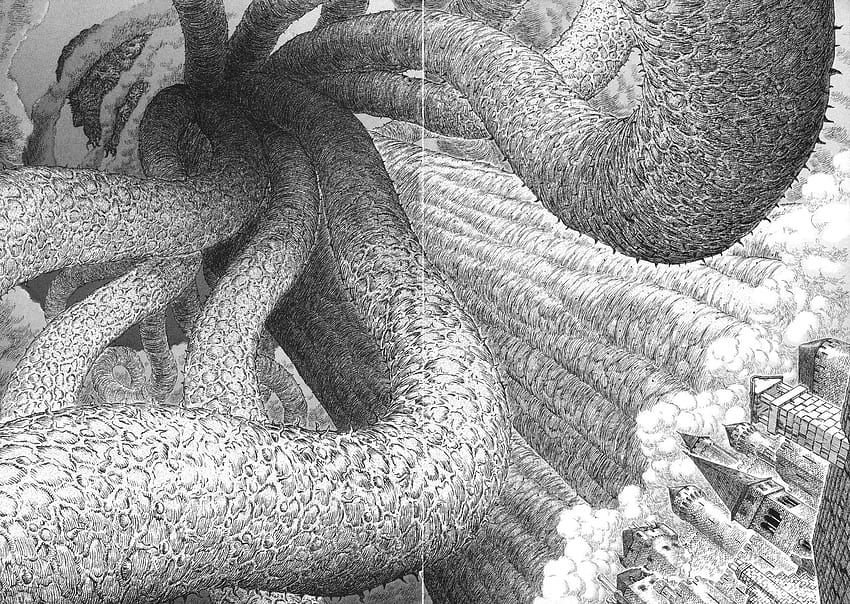Grounding Things in Life: Reflection on Berserk
By CHENGYUE ZHANG ‘24
Panel from Berserk. Courtesy of Kentaro Miura
Less than a year ago, due to its author Kentaro Miura’s sudden death, the long-running and highly regarded manga Berserk ended abruptly without a proper ending. Berserk continues to be published by Studio Gaga and Miura’s friend Kouji Mori. However, to most fans, Berserk will never be the same ever again.
I first encountered the story of Berserk from the 1997 anime series last summer and continued to finish the rest of the manga content not included in the anime. To me, the story of Berserk is about finding a reason for living and the strength to carry on despite continuous hardships. Just as everything is turning for the better, and Guts, the main character, is learning to trust his traveling companion again, the story ends.
364 chapters and 8400 plus pages of art. That is all we are left with.
How much did Berserk matter to me? Probably not that much. My brain is telling me that I would trade all my memory of Berserk with receiving five As for upper spring. Since when did I start measuring the value of everything in my life through grades?
“To really just sit in the moment is something I do not get to do at Exeter a lot. There is always the next appointment and the next assignment to procrastinate on.”
The ending of Berserk has been a ticking sadness that I would like to sit with once in a while. It reminds me of Neon Genesis Evangelion—another absolute classic in the anime community—which also had a messy ending. From the disturbing, metaphysical ending to the original 1995 anime and the endless number of remakes released throughout the years, each ending presents some new twists but never a believable resolution. In Eva’s case, the non-conclusive, unsatisfactory ‘ending’ actually fits pretty well with the show’s theme of depression. Its absence subverts our expectations and definition of a good story. It forces me to sit in a state of dissatisfaction and unsettledness. Thus, one learns slowly to appreciate its strangeness and accept the tragedy and the ‘unfinished’ story as final.
To really just sit in the moment is something I do not get to do at Exeter a lot. There is always the next appointment and the next assignment to procrastinate on. I seek instant gratification to distract me from stress.
I like math because it is simple and grounding. Compared to chemistry, for which I need to remember arbitrary constants to convert between non-sensible units and refer to millions of tables, math, as of right now, is intuitive. I try to solve each problem one by one, knowing that everything I need to figure it out is within me.
Thus by the same logic, I hate using my TI-84. Looking for it is always an annoyance, and after I scrambled through my backpack looking for it, plugging in the numbers seems harder than actually solving that integral. I always press the wrong button and am forced to go back. The need for complex calculations distracts me from working with those numbers that I’ve known for my whole life. I can’t keep track of anything but myself nowadays. Small inconveniences, such as having to use a calculator or the three seconds it takes to connect to PEA-secure, turn into unbearable menaces. I don’t like how irritable I am nowadays.
American superhero comic series continue running after a particular artist or storyboard director passes away. For manga, on the other hand, the art, story, and dialogue, with few exceptions, all come from one single person. Manga authors work on one story for years and even for their whole life: Hirohiko Araki’s JoJo’s Bizarre Adventure has been running since 1987, and One Piece by Eiichiro Oda has been around since 1997. Artists’ names and reputations are heavily associated with their manga titles. With this kind of creation model, manga just feels more personal. The story must resonate with the author in a special way because they commit significant time of their life to it. The readers and the authors all grow as the manga is published chapter by chapter, week by week, month by month, and resumes hiatus after hiatus. Reading manga feels like dialogue. If the author spends their waking hours perfecting every panel, the reader returns that effort through tirelessly waiting for the coming chapter and dwelling in each moment of the story along with the characters.
“Thus, due to its scale and the slow, sometimes irregular publishing schedule, I savor and admire the beauty of each pixel and stroke of the manga panel, never in a rush.”
Thus, due to its scale and the slow, sometimes irregular publishing schedule, I savor and admire the beauty of each pixel and stroke of the manga panel, never in a rush. Besides the adrenaline for a new plot twist or a good fight scene, I also enjoy the story at every second of it even if I know the ending already. I want to experience it all, the excitement and the quieter moments. I want to see how it all happens. As much as reading manga is entertainment, it is also a meditation on life.

